The following is extracted from the Odisha JEE 2011 brochure. Thanks to a post in rourkelacity.com for the pointer.
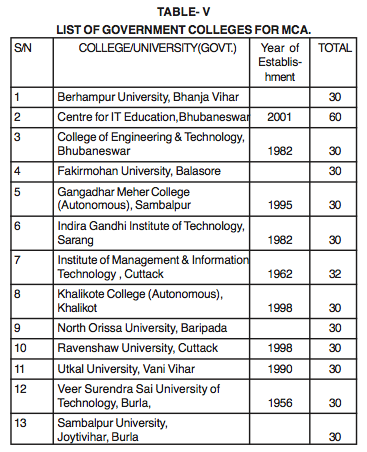
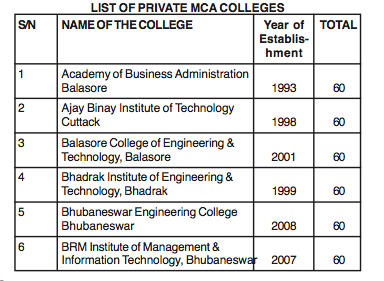
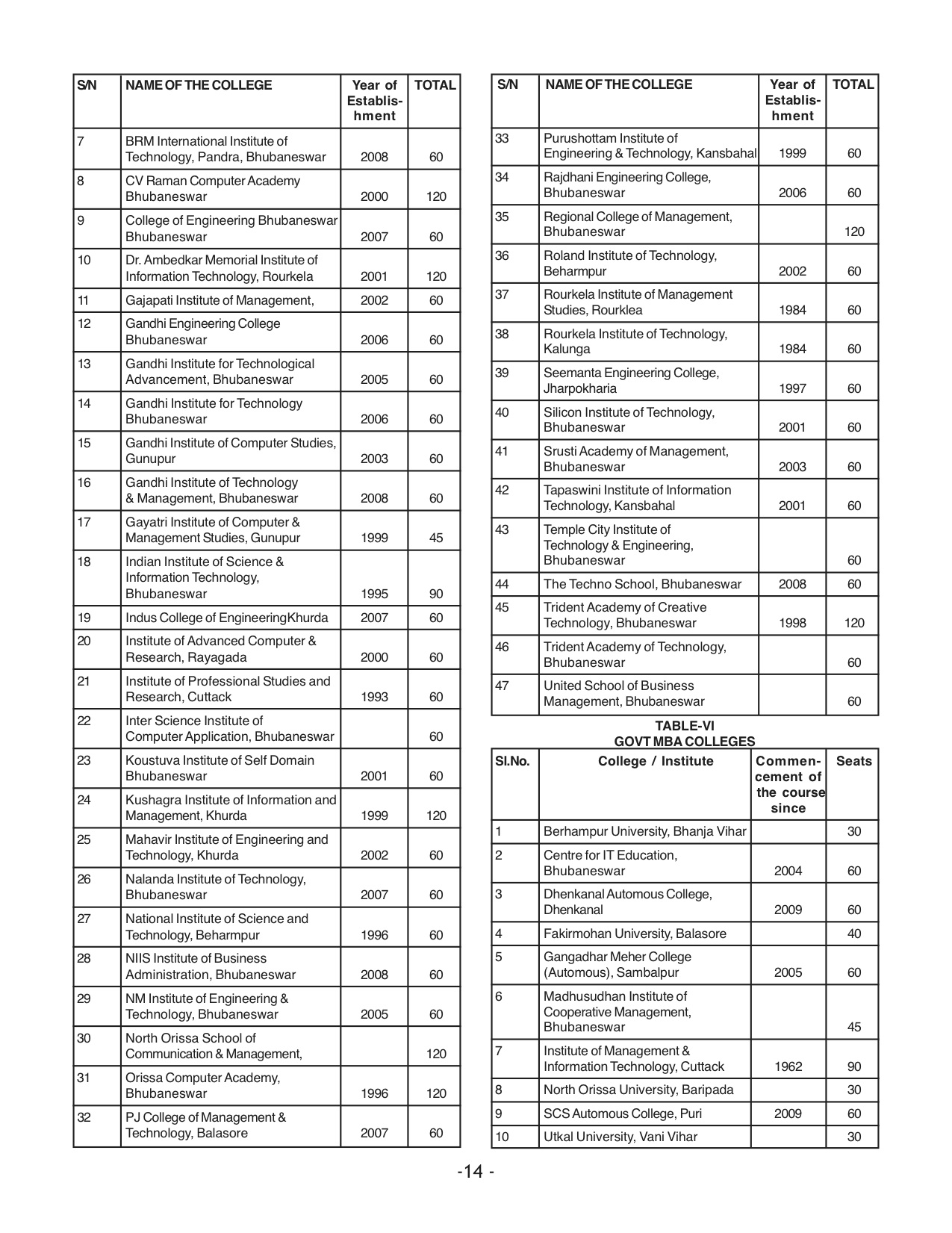
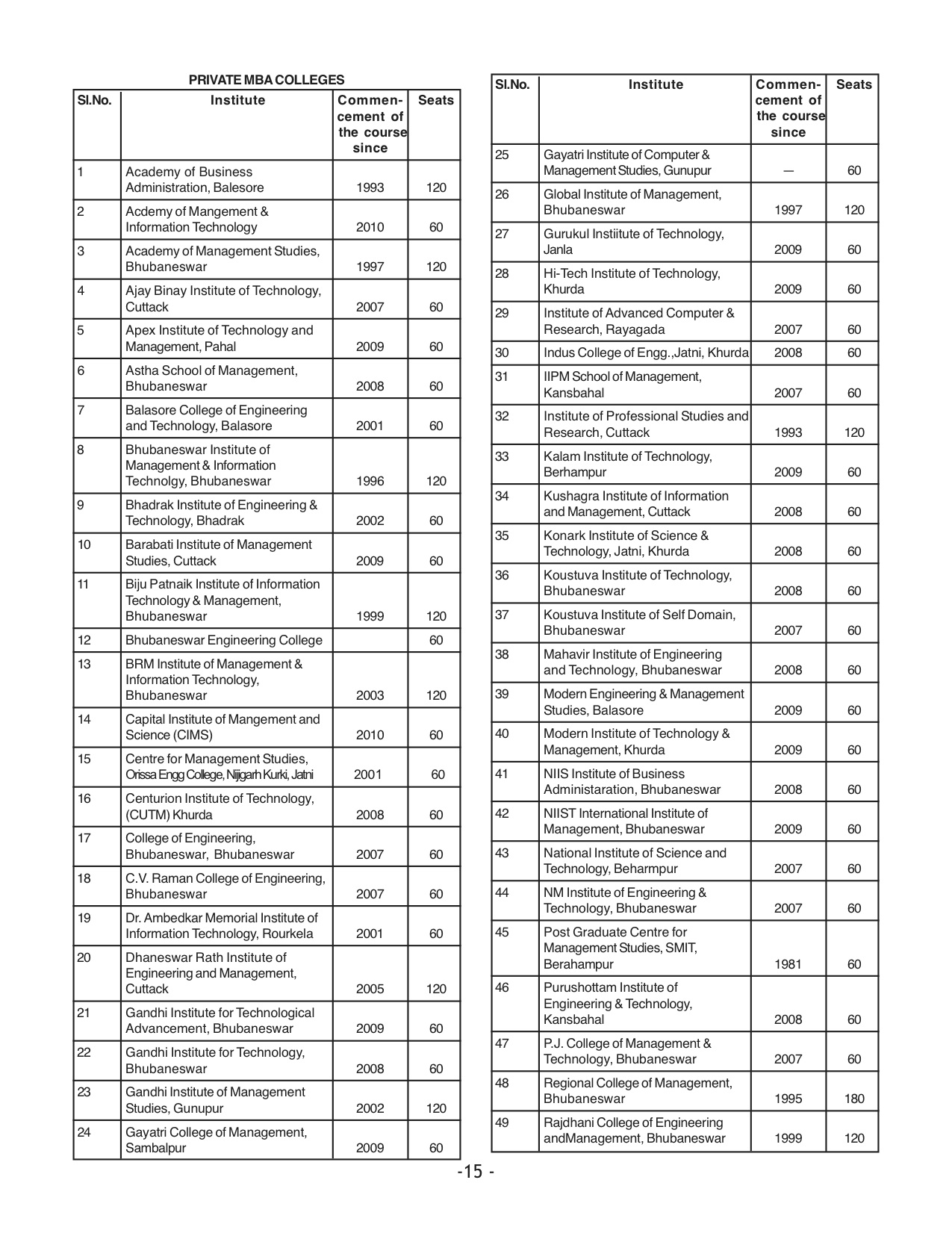
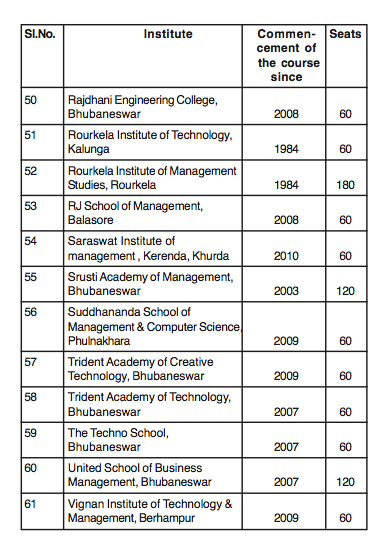 Note that one can study PG Diploma in Business Management and similar subjects (such as Rural Management) in several other institutions. Those are not listed above. Some of these institutions are: XIM Bhubaneswar, IMI Bhubaneswar, HDF Business School Bhubaneswar, IITTM Bhubaneswar, etc.
Note that one can study PG Diploma in Business Management and similar subjects (such as Rural Management) in several other institutions. Those are not listed above. Some of these institutions are: XIM Bhubaneswar, IMI Bhubaneswar, HDF Business School Bhubaneswar, IITTM Bhubaneswar, etc.
One can also pursue B.Sc (Hons) in Computer Science and M.Sc Computer Science in several institutions. SUIIT (Sambalpur University Institute of Information Technology) also offers courses in IT that are not listed above.
May 9th, 2011
Author : Chitta Baral
The following is extracted from the Odisha JEE 2011 brochure. Thanks to a post in rourkelacity.com for the pointer.
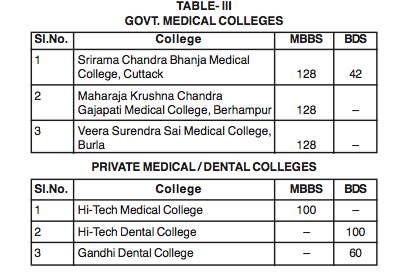
Note that in addition medicine and dentistry seats are also available at KIMS (part of KIIT) and IMS (part of SOA) Bhubaneswar.
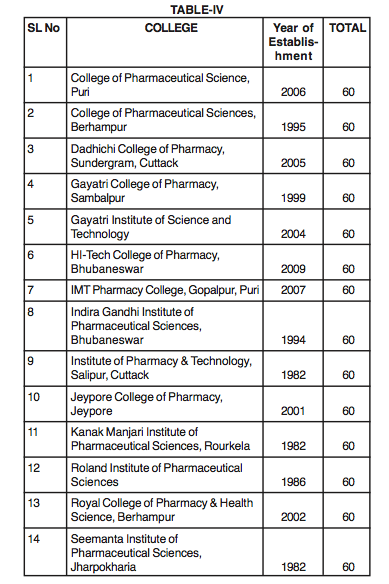
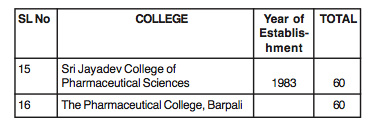
May 9th, 2011
Author : Chitta Baral
The following is extracted from the Odisha JEE 2011 brochure. Thanks to a post in rourkelacity.com for the pointer.
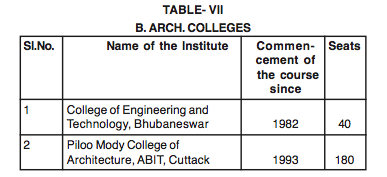
May 8th, 2011
Author : Chitta Baral
The following is extracted from the Odisha JEE 2011 brochure. Thanks to a post in rourkelacity.com for the pointer.
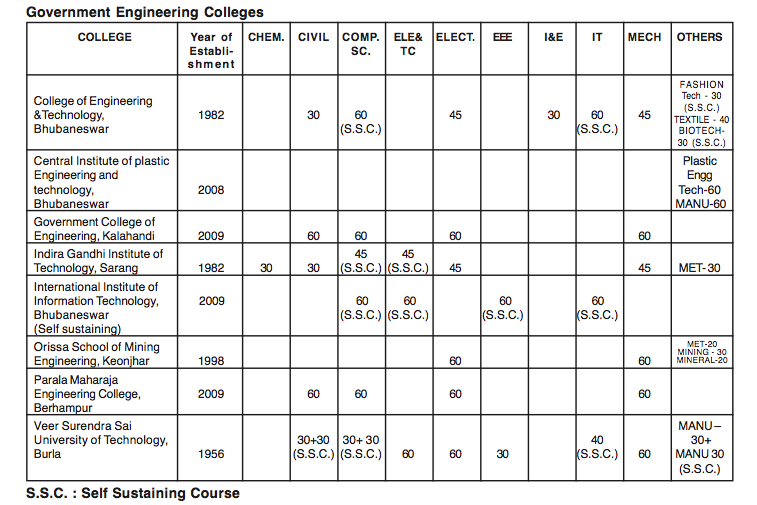
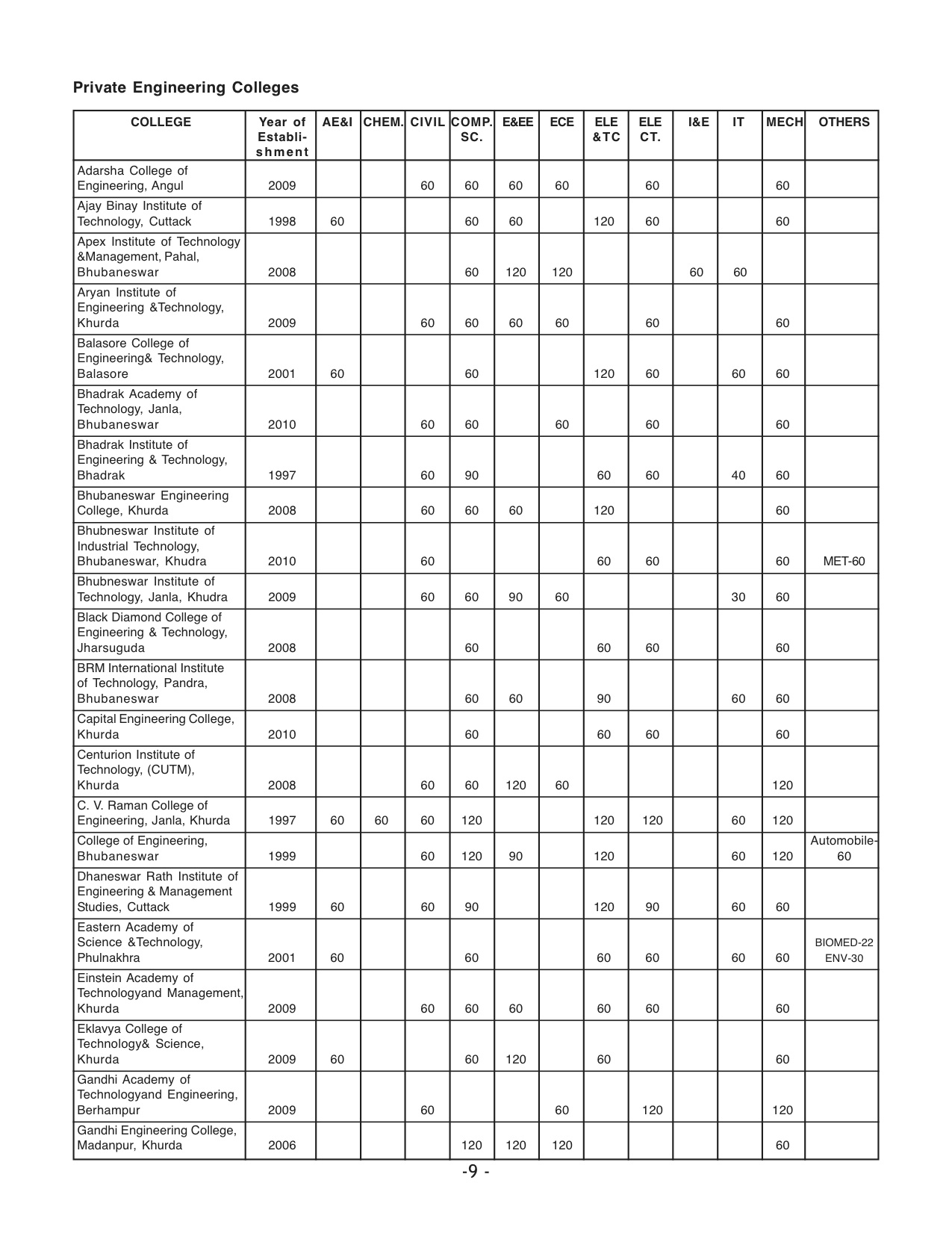
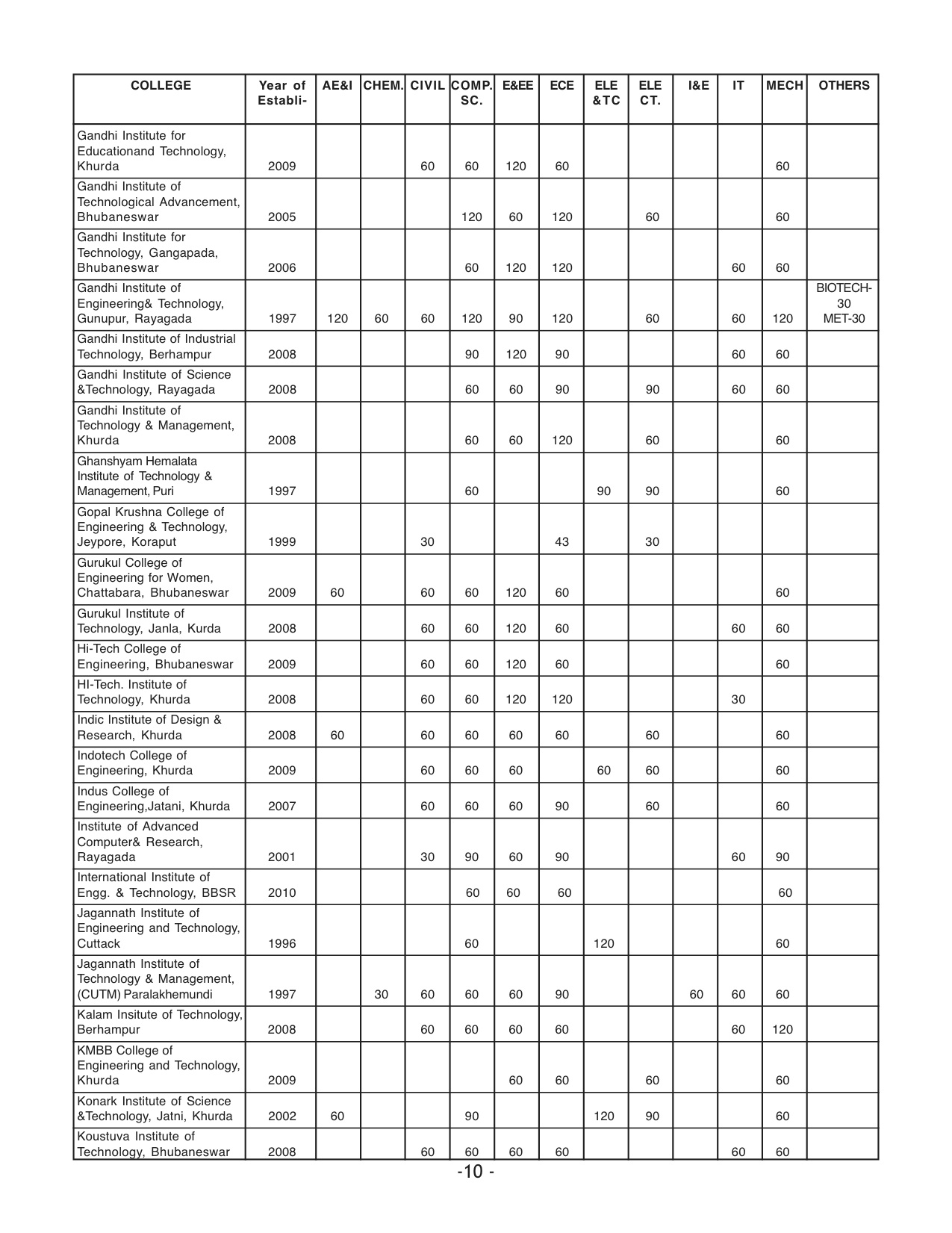
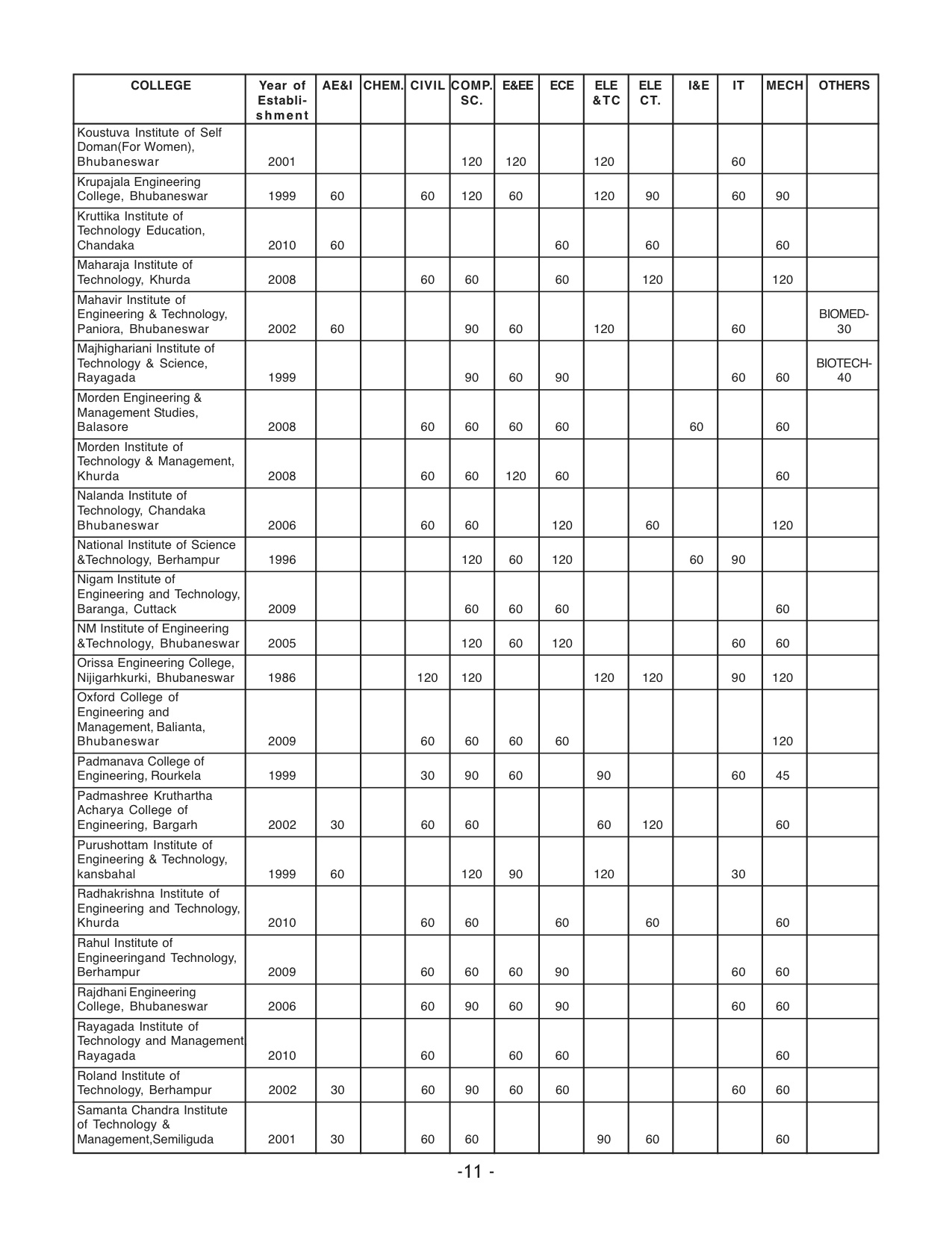
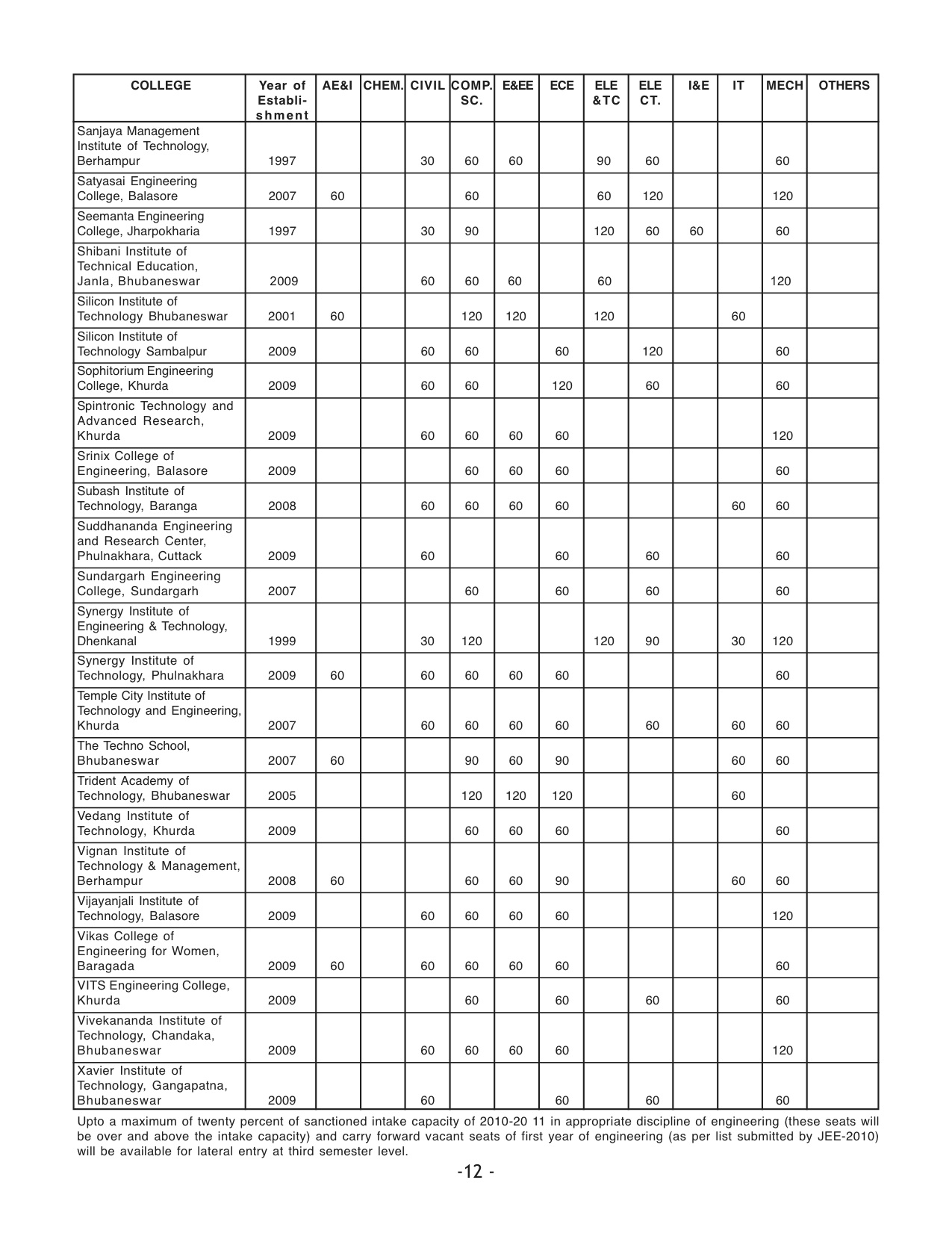
 Note that in addition to the above colleges (8 govt + 94 private), students can study engineering at the following other institutions in Odisha; but one needs to use different channels to get admitted there.
Note that in addition to the above colleges (8 govt + 94 private), students can study engineering at the following other institutions in Odisha; but one needs to use different channels to get admitted there.
- NIT Rourkela
- KIIT Bhubaneswar
- SOA Bhubaneswar
- Agricultural Engineering at OUAT Bhubaneswar
- IIT Bhubaneswar
- SU-IIT Sambalpur
In total, aspiring students of Odisha currently have a total of 108 institutions to pursue their Engineering degree.
May 8th, 2011
Author : Chitta Baral
The interview is at http://timesofindia.indiatimes.com/city/bhubaneswar/Student-unrest-wont-occur-in-my-tenure-Prof-Sahu/articleshow/8171439.cms. Following are some excerpts.
Q-The University is often in the news for the wrong reasons like mismanagement, student unrest, etc. What is your plan to bring Utkal University back on track?
A-I want Utkal University to be a centre of excellence and lead centre in research and consultancy works both at the national and international-levels. I studied here. I also taught here. I have a vision. I will try my best in making positive contribution towards achieving the goal during my tenure.
Q-How?
A-Actually we have to develop inter-disciplinary teaching and research. There is a need to restructure the post-graduate programme. One person cannot do this. Hence, I stress upon team work. In other words, different departments ought to sit together, discuss what is being taught to students and their relevance and, if required, redesign them. The changing scenario also warrants the university to reorient its focus, to be collaborative with industries which will eventually benefit the students and the institution as well.
Q-Any specific plan?
A-Professional and job-oriented courses are the need of the time. I have plans to open such programmes like fashion technology, geo-informatics and environment science. I will discuss with my colleagues and explore possibilities of opening other relevant courses.
Q-But Utkal University already has a number of such courses. Don’t you think before going for new ones those already there need to be reviewed to find out the net benefits they are giving to the students?
A-Sure, I agree the course module has to be so designed that students taking admission must not feel they are wasting their time and that they become truly employable. We have a lot of self-financing courses. I will review the course curriculum through experts and go for changes wherever necessary.
Q-Any move for foreign tie-up?
A-That is very much there in my mind. I will explore the possibility of Utkal University undertaking research or launching new course programmes in collaboration with foreign universities. The university has to have linkages with industries. This will go a long way in helping students. I will try to set up some school of studies. For example, management, economics, commerce and personnel management and industrial relations (PMIR) could jointly become a school of studies for the purpose of research and other academic activities.
… I am also a product of the IIM-Ahmedabad. I know management. Utkal University requires a professional and qualified vice-chancellor. I fit the bill.
…
Q-A good library has always been the most attractive place for students. Do you believe the Parija Library meets expectations?
A-A library is the mirror of any educational institution. I have taken it as my priority to improve the quality of the library in the campus. I will try to equip it with latest technology so that students could use it round-the-clock. I have already had a word with the chief librarian. I have sought for a wish list, to be submitted to me soon. Accordingly, we will proceed.
Q-There are also allegations of financial irregularities against the university. What are you going to do with that?
A-I am a professor of finance. I will streamline it.
Q-What about modernizing the administrative apparatus?
A-That is going to happen. There will be an academic calendar, to be followed religiously. The examination system will be completely computerized. On the whole, there will be greater use of information technology in the functioning of the university. Times have changed. We have to tune ourselves so as not to fall behind.
Q-Just buildings or computers do not foster the right kind of academic atmosphere in a university. That is why many educational institutions in India and abroad give stress on creating greenery in their campuses. Utkal University campus pathetically looks desolate.
A-Yes, that is a point no one should forget. I am taking steps. There will be a change.
I will add my thoughts on this soon. Please add your thoughts in the comments section. Please be polite.
My thoughts:
- I disagree with the statement that "Professional and job-oriented courses are the need of the time". It was a few years back. Now, with so many new universities and colleges opening up, there is plenty of job opportunity in academic settings.
- Thus, Utkal University should focus on improving the quality of its programs, its faculty, its research and its graduates and focus on research and producing top-notch Ph.Ds who go into academia all over India.
- With the easy availability of data and information on publications, citations and various benchmarks based on that, many future decisions at MHRD, UGC, DST, etc. will be based on those data. If Utkal University does not focus on those benchmarks it will lose out and as a result Odisha will lose out.
- It should aim to have the best group in some small number of fields, say 3-4. In other words, in those fields, Utkal University should be the best in India and among the top in the world.
May 6th, 2011
Author : Chitta Baral
The web page of Azim Premji University is http://www.azimpremjiuniversity.edu.in/. Following is an excerpt from a report in Times of India.
The Azim Premji Foundation (APF) … has decided to set up new institutes in Orissa. "The Institute of Learning and Development will be set up in the state under Azim Premji University. We also have plans to set up low-cost model demonstration schools in the districts. The projects will begin in the next couple of years," said the chief executive officer of APF, Dileep Ranjekar.
… He announced the launch of three post-graduate courses at the university, starting from the next academic session. "The absence of a large number of committed, qualified and trained professionals is one of the major constraints in the fields of education and development. The courses we have designed in our university will definitely help prepare outstanding professionals in the education sector," said Ranjekar. The courses offered are: masters degrees in education, development and teacher education.
"There is a huge dearth of experts in the fields of education and development. Teachers’ education in the country is of very poor quality and there has been no concerted effort to improve the curriculum and pedagogy," Ranjekar said.
Those interested in studying in the university will also be provided facilities like scholarships, loans, partial or full tuition fees and living expenses. "We will ensure that no student misses out on opportunities to study in the university due to financial constraints," he maintained. Ranjekar added that the foundation also has plans to set up an institute for assessment and accreditation of educational institutes.
May 5th, 2011
Author : Chitta Baral
The page http://mohfw.nic.in/index1.php?lang=1&level=0&linkid=37&lid=46 lists the progress with respect to recruitment for the new AIIMS-like institutions. Following are some links and excerpts.
Advertisement for the post of Director at each of the six AIIMS-like institutions being set up under PMSSY: Last Date of Application : 15th December, 2010
Excerpts: If you think you rate among the best, carry vision, dynamism, enterprise and intellectual integrity, and harbour a passion for establishing and heading India’s most premium healthcare institution, this could be the opportunity you have longed for. The Ministry of Health & Family Welfare is setting up six autonomous medical institutions in different parts of country (Bhopal, Bhubaneswar, Jodhpur, Patna, Raipur, and Rishikesh) on the lines of All India Institute of Medical Sciences, New Delhi. You could head one of these premier medical institutions, if you possess the right credentials.
You would lead a team of highly qualified medical professionals and teachers in different specialties, drive policy-making with innovative and best practice norms, facilitate first-rate patient care, clinical research, and academics, and create a facility of which the country can be proud. You will train the best of medical graduate and post graduate to generate much needed teaching faculty for the country.
If you think you fit the requirements, write to us.
The applications that were received are listed at: http://mohfw.nic.in/Director%20NIC.doc. (A new link is at Application received for the post of Director (AIIMS) like institutions under PMSSY Projects (PDF, 75 KB). There are 100 applications, many from people with Odia sounding last names.
Two other ads that are listed in this page are:
May 5th, 2011
Author : Chitta Baral
The Maharashtra Knowledge Corporation Limited (MKCL) web page is at http://www.mkcl.org/. The following tathya.in news item in Sambada reports on Odisha’s plan for Odisha Knowledge Corporation Limited along the lines of MKCL.
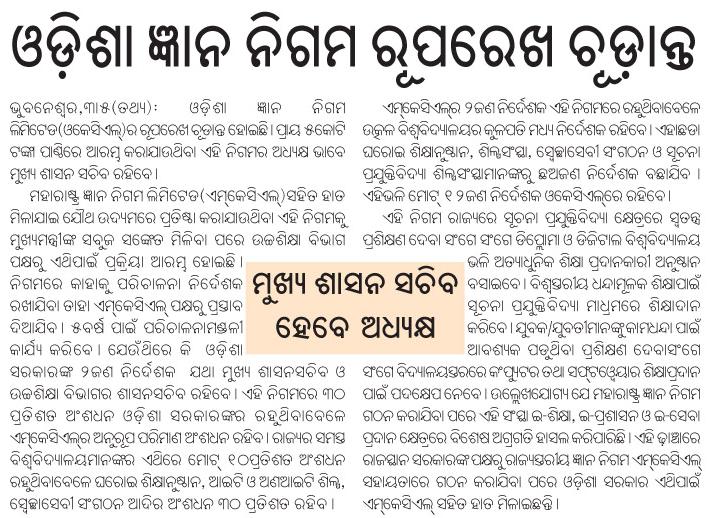
May 4th, 2011
Author : Chitta Baral
Following is from a PTI report in ibnlive.com.
Union Environment Minister Jairam Ramesh today said the Centre would set up two national institutes for specialised studies on coastal eco-system and turtles in Orissa at an investment of Rs 50 crore. The Ministry of Environment and Forest (MoEF) would help set up these two institutes which would include a National Centre for Wetland and Coastal Eco-system Studies at a cost of Rs 40 crore, Ramesh told reporters here. The amount would be spent over the next five years and the centres would operate from Bhubaneswar and Chilika. Similarly a Centre for Turtles and Bio-diversity Studies would be established at an investment of Rs 10 crore and the state government would decide on its location, the environment minister said. … The announcement came a day after the Union Minister said that a technical institute would be set up in Bhitarkanika National Park area in Kendrapara district to train local youths in plumbing and coir industries.
Thanks to Minister Ramesh for these. But they don’t compensate the harm that Ramesh and his ministry have done by stopping the construction of Vedanta University.
May 1st, 2011
Author : Chitta Baral
The newsletter is at http://www.centraluniversityorissa.ac.in/Downloads/Newsletter_Feb.%202011.pdf.
Page 9: From the Vice-Chancellor’s statement:
From the forthcoming academic session the University proposes to introduce five new subjects under New Schools …
As for the progress of our physical infrastructure of the main campus, the construction of the Boundary Wall is almost through and the construction of buildings in the first phase, the Girls’ Hostel, the Boys’ Hostel, the Guest House and the Academic Block I are likely to start towards the end of March.
… As a Founding Vice-Chancellor my vision of this composite University has two well-defined thrust areas in terms of priorities: One is healthcare and subsequently the introduction / dissemination of medical education and the other is related to the development and welfare of the tribal community.
Page 12: Development of Campus (progress of the Boundary Wall)
The main campus of our University is coming up at Sunabeda. The construction of boundary wall undertaken by CPWD is in progress. Out of actual 9.3 kms of boundary wall about 8.6 kms work is completed. The pillar excavation, raising columns on rocky terrains of the boundary is almost over. The brickwork and plastering of the Boundary Wall is going on in full swing.
The master plan has also been approved by the University Building Committee. Recently the Chief Engineer of CPWD has visited our main campus in Koraput and inspected the progress of construction work.
Page 24: The List of forthcoming Centres and Schools of the Central University of Orissa duly approved by the Academic Council and the Executive Council
The Academic Council and the Executive Council of CUO have approved the establishment of the following new Schools and Centres:
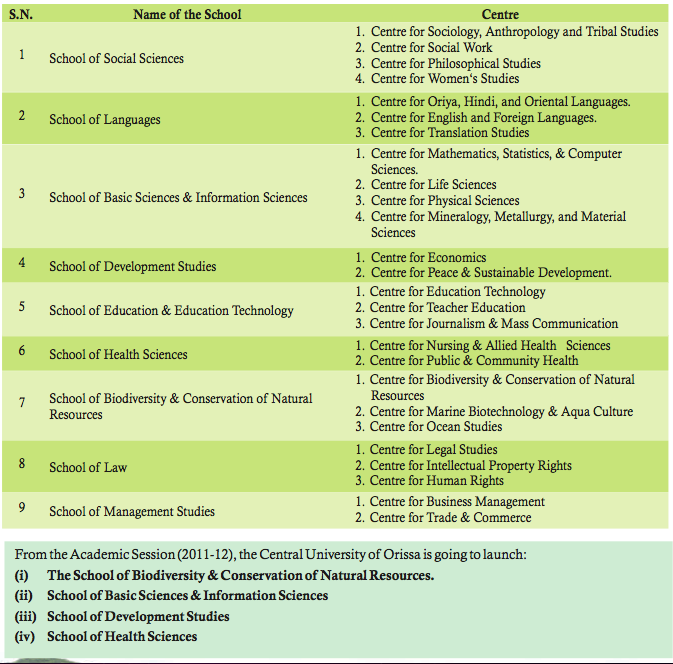
Page 31: Centre for Tribal Welfare and Community Development
Extreme poverty has its own typical features and adverse impacts on any society. Migration in search of survival for livelihoods is gradually becoming a common phenomenon in the KBK region as well as in the other parts of the country. For the survival of local people, the traditional skill based occupations are gradually becoming uneconomic options. On the other hand the same traditional skills have a flourishing market value in neighbouring states. This creates situations for mass migration, often with the family, in search of a livelihood even under stressful conditions. In the recent trend of economic development, the traditional skill based occupations have also became largely resource dependent. With the depletion of natural resources, the traditional occupations of tribes are fading away, though these are also the outcome of the occupational mobility.
The Koraput District comes under the tribal sub-plan area and PESA. As per the provision, PESA promises devolution of power to Panchayats completing the tribal self-rule. While larger accountability for the utilizing the provisions under the Act is vested in the Panchayats, due to poor understanding of the Act by the Panchayatiraj functionaries the Act seems to have lost its legal tooth in this area. This calls for wider accountability of government and civil society bodies to build the capacity of the PRIs thereby enabling them to utilize the power and authority vested in them for the development of their area and the communities. The customary rules existing even today provide a framework to compare the provisions of PESA and a suitable blending of two can contribute towards good governance to spearhead developmental process.
According to the report of the Committee on the Constitution of Separate Development Board in Orissa, 96% of Community Development Blocks in KBK districts are either ‘very backward’ or ‘backward’. According to the UNDP Human Development Report 2004, Malkangiri, Kandhamal, Gajapati, Koraput, Nabarangpur are the bottom five districts in terms of HDI values, three of which are in KBK region.
Considering the above issues, the Centre for Tribal Welfare and Community Development (CTWCD) has been established as University’s first initiative of Corporate Social Responsibilities to foster the needs and take up the issues of the tribals of KBK region as well as other tribal groups of India.
The Centre for Tribal Welfare and Community Development at Central University of Orissa is functional since 5th June,2010. A batch of tribal youth has already received training on mushrooms cultivation. New initiatives are under progress and it is hoped that various trade identified by the Centre will benefit the tribes.
Page 47: Progress of new Campus
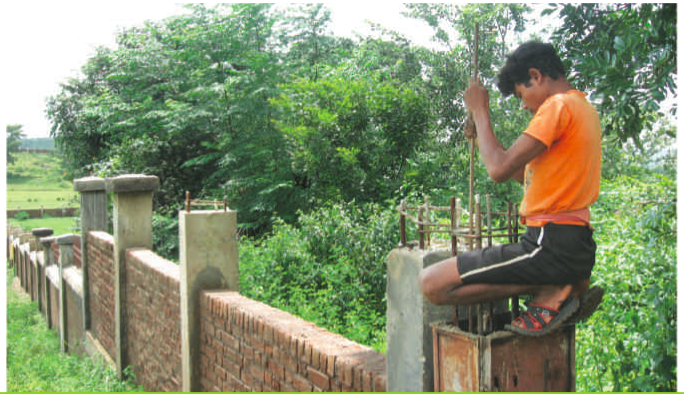
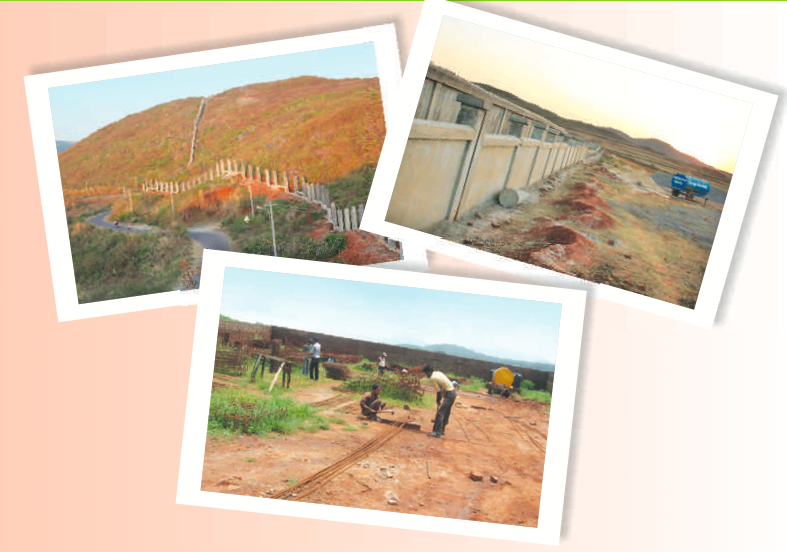
April 27th, 2011
Author : Chitta Baral
Update: TOI reports that MHRD has given in-principle approval to locations in Bangalore and Ajmer.
Several branches of Aligarh Muslim University, a central University, is in the pipeline. Following are some news excerpts on them.
- This year’s (2011-12) budget has Rs 50 crore for an Aligarh Muslim University centre at Murshidabad (West Bengal).
- This year’s (2011-12) budget has another Rs 50 crore for an Aligarh Muslim University centre at Malappuram (Kerala).
- 250 acres of land has been allocated for an AMU campus in Kishanganj in Bihar. [Times of India]
- Tamil Nadu WAQF board is trying for an AMU branch. It has identified 250 acres and has approached the center regarding it. [Times of India]
April 27th, 2011
Author : Chitta Baral
The web page of this contest is at http://settlement.arc.nasa.gov/Contest/. The results of the 2011 page is at http://settlement.arc.nasa.gov/Contest/Results/2011/index.html. Following are excerpts from that web page.
Winners
Grand Prize
The Grand Prize for the 2011 Space Settlement Contest went to a large team of 7 students (11-12 grade), Gaurav Kumar, Deepak Talwar, Harman Jot Singh Walia, Mahiyal B. Singh, Kaenat Seth, Ishaan Mehta, and Navdeep Singh Makkar, from Punjab, India for creating the Hyperion Space Settlement. They also won the NSS Bruce M. Clark, Jr. Memorial Space Settlement Award.
First Prize
11-12 Grade First Prize
- Asteria, Sarah Bell, Queensland, Australia, Individual.
- Shangri-la, Odisha, India (Delhi Public School), Small Team.
- CRONOS, Constanta, Romania (Colegiul National "Mircea cel Batran"), Large Team.
9-10 Grade First Prize
- Adamas, Aditya Bathla, Punjab, India (Apeejay School), Individual.
- AMOS (Advanced Moon Orbiting Settlement), Romania ("Tudor Vianu" National High School of Computer Science), Small Team.
- Brisinger, Constanta, Romania (Colegiul National "Mircea cel Batran"), Large Team.
6-8 Grade First Prize
- The Satus Novo Serere, Hasan N. Kahn, Riyadh, Saudi Arabia (American International School), Individual.
- Big Bang, California, USA (Sequoia Middle School), Small Team.
- EON: Everlasting Orbita Nation, New York, USA (Cortland Junior Senior High School), Large Team.
Specialty First Prize
- S’ukhavati, Mrinal Chaudhury, Odisha, India (Delhi Public School), Artistic Merit.
- Life on the Space Station, Seebor, Romania (Tudor Vianu National High School of Computer Science), Literary Merit.
- Arcadia, Shanghai, China, Life Sciences.
Rourkelacity.com has some details about the winners. Following are some excerpts.
Among the winners include the team comprising Siddharth Tripathi, Akshat Dutt and Nisarg Behera of class –XII, and Mrinal Chaudhary of class-VIII of the same school.
The team comprising Siddharth, Akshat and Nisarg won the first prize in the 11th -12th grade for their project titled “Sangri-La”, a space settlement colony to provide exceedingly proficient and enjoyable living amenities for 20,000 permanent space residents. The colony that the team has proposed, is designed as a heavenly abode for settlers who can revel in the extraordinary luxury away from the earth. Thinking out of the box, the team proposed a major scientific research laboratory as well as a business hub in space, bio-regenerative life systems incorporating all biological components, state of art meditation halls, an efficiently functioning government machinery to take care of the law and order, a new currency named ‘Hawking’ and also a National Shangri-La Stock Exchange to help people participate in World economic affairs.
Mrinal won the specialty first prize for Artistic merit in her paper presentation titled “Sukhavati”. Mrinal in her report presented the colony and several paintings and diagrams depicting the interior and the exterior, living spaces, laboratories, recreation areas etc. of the colony.
… Mr.Bijoy Bahadur Mathur, Science Head of the School and the mentor to these students has been instrumental in preparing the students for this competition.
Teams from Odisha have been doing very well in this contest for the last several years.
April 26th, 2011
Author : Chitta Baral
Following is from http://www.niser.ac.in/phd-advt-jul2011.php.
NATIONAL INSTITUTE OF SCIENCE EDUCATION AND RESEARCH (NISER),
Institute Of Physics Campus,
PO- Sainik School, Sachivalaya Marg, Bhubaneswar,
Ph- 0674-2304000, Fax- 0674-2304070, E-mail- aoacad@niser.ac.in, web:- http://www.niser.ac.in
Advt.No:NISER/ACAD/Ph.D/2011â€12(1)
Notice for Admission to Ph.D. Program for 2011-12 (Odd semester)
Applications are invited from Indian citizens for admission to Ph.D Program scheduled to commence from July 2011 in the following schools of basic sciences at NISER Bhubaneswar:
1. School of Biological Sciences
2. School of Chemical Sciences
3. School of Mathematical Sciences
4. School of Physical Sciences
The students should have qualified the CSIR-NET/GATE/JEST/NBHM or equivalent examination valid for the current year in the relevant area of research. UGC-CSIR JRF qualified candidates can avail the fellowship directly from UGC or CSIR, whereas, students selected for Ph.D program based on GATE scores, are eligible for Fellowship from NISER as prevailing in DAE.
NISER provides Rs.16,000/- as fellowship for Selected Candidates who opt for DAE Fellowship. The application form is available free of cost and can be downloaded along with the guidelines. Else, the form can be obtained by post, or in person, from the academic section, NISER Bhubaneswar. There is no application/entrance fee. To and Fro single 2nd sleeper Class railway fare will be provided to those candidates who are called for the test/interview.
The last dates: For postal requests for application Forms : April 25, 2011
To submit the filled-in application form : May 2,2011
For more details regarding Eligibility, Selection procedure, How to apply and other important details, download the guidelines ( http://www.niser.ac.in/phd-advt-jul2011.php ) and if needed consult the websites of different schools of NISER.
ADMINISTRATIVE OFFICER(III) ACADEMIC AFFAIRS
Following is from http://iitbbs.gov.in/phd_admission.php?type=fnews2.
INDIAN INSTITUTE OF TECHNOLOGY BHUBANESWAR
BHUBANESWAR – 751013
No: IIT/Acad/Ph.D/Admn./2011-2012
ADMISSION TO Ph.D. PROGRAMME
Indian Institute of Technology Bhubaneswar invites application for admission to Ph.D. Programmes in the following categories.
a. Regular full-time scholars with Institute fellowship.
b. Research scholars sponsored by and employed in industry/orgainsation having R & D facilities.
Schools and fields of Research
1) School of Basic Sciences (Physics, Chemistry, Mathematics) :
Physics : Fiber Sensors, Surface Plasmon, Nano & Bio-Photonics, Infrared & Terahertz Sensing, Spectrocopy and Imaging, Solar cell, Waveguide & Interferometer, Electron and ToF spectroscopy of biomolecules, clusters and atoms, Ion solid interactions, nanomaterials, Soft condensed matter physics, Nanostructured Materials, Functionilized Nanostructure and Devices, Optical Spectroscopy and Transport Properties, Multiferroics, Superconductivity, Quantum magnetism in low dimensional system, Geometrically frustrated system, Magnetic nanostructures and thin films.
Chemistry : Organometallic Chemistry; Homogeneous Catalysis; Supramolecular Chemistry; Crystal Engineering; Organic Solid State Chemistry; Nanomaterials; Polymorphism; Coordination Chemistry; Materials Chemistry; Molecular Modelling; Magnetochemistry; Synthesis of natural products and modified nucleic acids; Spectroscopy; Bio and Protein Chemistry; Theoretical Chemistry (Statistical Mechanics), Organometallic Chemistry, Catalysis for Fine Chemicals, Biophysical chemistry.
Mathematics: Functional Analysis, Artificial Neural Network, Geometric Programming, Queuing Theory, Applied Probability models and Stochastic models in the theory of queues, mathematical finance, Dynamical systems, Complex Dynamics, Fractals, Optimization Techniques.
2) School of Earth, Ocean & Climate Sciences : Environmental Earth Science, Hydro Geochemistry, Water – rock interaction, Biogeochemistry.
3) School of Electrical Sciences (Electrical Engineering, Electronics & Communication Engineering, Computer Science Engineering, Instrumentation Engineering): Digital Signal Processing, Soft and Evolutionary Computing, Sensor Network, Intelligent Instrumentation, Digital/Image/Distributed Signal Processing, Opto Electronics and Optical Communication, Computational Electromagnetics and Antenna Design, Metamaterials, RFID, Satellite Communication, Power system protection, Smart grids, Electric drives and Control, Power quality, custom power devices, renewable energy sources (wind and solar).
4) School of Humanities, Social Sciences and Management: Indian English Literature, Commonwealth studies, Indian Diaspora Literature, Autobiographical Travel Literature and Memoirs, international and interregional trade, Rural development and planning, Banking and Finance, Labour economics, Consumer Psychology, Psychology of Personality, E-Commerce, Clinical Psychology, Environmental Economics and Natural Resource Management, Valuation of Natural Resources.
5) School of Infrastructure (Civil Engineering): Structural Engineering, Geotechnical Engineering, Environmental Engineering, Water Resource Engineering, Transportation Engineering Structural Dynamics, Earthquake Engineering, Disaster Mitigation Engineering, Concrete.
6) School of Mechanical Sciences (Mechanical Engineering, Metallurgical & Materials Engineering) : Conjugate Heat Transfer, Thermal Engineering, Radiation Modelling, CFD/HT, Transport Phenomena in Material Processing, Ultrafast Radiation Heat Transfer, Technical Acoustics, Noise and Vibration, Industrial Noise control, Composite Materials, Finite Element method, Probabilistic Mechanics, Deterministic & Random Vibration, Sandwich structures, Solid mechanics, Smart composite structures, IC engine, Heat transfer, Refrigeration and Air Conditioning, Industrial Engineering, Logistics, Supply Chain Management, Quality Control, Production Planning and Control, Optimisation Techniques.
Eligibility:
PhD (Engineering): 60% marks or 6.75 CGPA in M. Tech/M.E with consistently good academic record OR B.Tech/B.E with 70% or 7.5 CGPA with valid GATE Score (Very Good) and consistently good academic record
PhD (Science): 1st class in M.Sc./ M. Tech with consistently good academic record (equivalent CGPA) and valid GATE/NET CSIR/UGC score
PhD (HSS): 55% marks or equivalent CGPA in Master degree with UGC/NET score OR M. Phil degree
How to Apply: Application form, downloadable from www.iitbbs.ac.in, should be sent to Assistant Registrar (A&E), IIT Bhubaneswar, Samantapuri, Bhubaneswar, Orissa – 751013 along with a Demand Draft of Rs.200/- (Rs.100/- for SC/ST candidates) drawn in favour of "IIT Bhubaneswar" on any nationalized bank payable at Bhubaneswar. Please superscribe ‘Application for Admission to PhD programme’ on the envelope. Application form may also be obtained from the Academic Section, IIT Bhubaneswar against a demand draft on every working day.
Important Dates : Application forms can be submitted throughout the year. Last date for submitting application form for Autumn 2011-12: 13th May 2011.
April 25th, 2011
Author : Chitta Baral
Following is from Orissadiary.com.
Dr RN Kabat joined as the Promoter-Director of the Mahanadi Medical Education Trust, which has been set up to establish a medical college here and run ensure its smooth functioning.
Dr Kabat worked as the chief of medical services in three subsidiaries of the Coal India, Mahanadi Coalfields Ltd, Eastern Coalfields Ltd and Central Coalfields Ltd before retirement.
During his tenure at the MCL, he oversaw the setting up of the 250-bed Netaji Subash Central Hospital and the Nursing College at Talcher.
A surgeon of repute, Dr Kabat brings with him his vast experience in managing multi-functional hospitals.
With his appointment, the MCL hopes to set up the proposed medical college at the earliest.
The responsibility of this position is described in this ad. Following are some excerpts.
1. Candidate will act as a Promoter Director of Mahanadi Medical Education Trust having broadly to carry out the following activities.
2. To convene the meeting of Mahanadi Medical Education Trust as well as liaisoning with State / Central Govt. Agencies / Medical Council of India / University Authorities relating to establishment of a new Medical College.
3. To obtain Essentiality / No Objection Certificate from the State / Central Govt. / any other Authority as required
4. Take initiative in planning & designing the Institute infrastructure through appropriate agencies and its approval from the Competent Authority.
5. Preparation of Annual Budget and presentation before the Trust / Board
6. Take initiative for Manpower Planning
7. Construction of infrastructure of the Institute
April 20th, 2011
Author : Chitta Baral
The following is compiled from various pages of http://www.utkal-university.org/.
| Departments |
Faculty |
Program offerings and seats |
| Analytical and Applied Economics. |
Professors:
1) Dr. (Mrs.) P. Mishra – Mathematical Economics, Regional Economics & Environmental Economics
2) Dr. K. B. Das – Regional Economics, Mathematical Economics
3) Dr. Bhabes Sen – Quantitative Techniques, Econometrics, Mathematical Economics, Statistics
Reader
1) Dr. (Mrs.)Mitali Chinara – Mathematical Economics & Econometrics
Lecturer
1) Mrs. Aparajita Biswal – Econometrics, Mathematical Economics
2)Shri Alok Ranjan Behera – Financial Institution & Markets
3) Shri Amarendra Das – Environmental Economics, Natural Resource Management
|
M.A. –88, M.Phil – 10 |
| Ancient Indian History, Culture and Archaeology |
Professors
1) Dr. Sadasiba Pradhan : Ancient Indian History, Art History & Archaeology
Reader
Dr. Sanjay Acharya – Ancient Indian History, Art and Archaeology.
Lecturer
1. Mr. Anam Behera – Ancient Indian History, Culture & Archaeology.
2. Dr. Sushanta Ku. Patra –
|
M.A. –32, M.Phil –10 |
| Anthropology |
Professors
1. Dr. P. K. Nayak – Social Anthropology, Development Anthropology
2. Dr. P. K. Das – Physical Anthropology & Human Genetics
3. Dr. J. Dash – Social Anthropology
4. Dr. K. K. Basa(On Lien) – Pre-historic Archaeology
Readers
1. Dr. (Mrs.) R. Mohanty – Population Studies, Biological Anthropology
2. Dr. (Mrs.) S. Acharya – Social Anthropology.
3. Dr. (Mrs.) U. Aparajita – Social Anthropology & Development Anthropology.
Lecturer
1. Mr.D. Sahoo – Pre-historic Archaeology.
|
MA/MSc- 32, MPhil –10 |
| Biotechnology |
Reader
Dr. Jagneshwar Dandapat : Cell & Molecular Biology, Immunology
|
M.Sc – 10 |
| Botany |
Professors
1. Dr. H. K. Patra – Environmental Science(Environmental Physiology)
2. Dr. P. K. Chand – Cytogenetics, Genetic Engineering.
3. Dr. S. P. Adhikari (on lien) – Physiology, Biochemistry & Ecology of Cyanobacteria.
Readers
1. Dr. (Mrs.) S. Sahoo – Plant Physiology and Biochemistry
2. Dr. P. K. Mohapatra (on lien)– Ecotoxicology
3. Dr. K.B. Satapathy –
Lecturer
1. Dr. Chinmay Pradhan
|
M.Sc. –32 M.Phil –10
SF – M.Env Sc. – 16
SF – M. Applied & Ind. Microbiology – 16
|
Business Administration
|
Professors
1. Dr. P. K. Sahoo,(Head of the Department) – Financial Management
2. Dr. P. K. Mohanty(On-Lien) –Human Resource Management
3. Dr. N. C. Kar – Financial Management
4. Dr. B. K. Mangaraj(On-Lien) – Information Resource Management
5. Dr. J. K. Panda – Financial Management
Readers
1. Er. P. C. Ratha – Operations Management
2. Dr. B. B. Mishra – Marketing Management & Organisational Behaviour
Sr. Lecturer
Dr. Muna Kalyani – Human Resource Management & Organisational Behaviour
Lecturers
Dr. B. R. Jena(on leave) – Business Economics
Dr. Dasarathi Sahu – Information Technology
|
SF – 5yr Integrated MBA – 60
SF – 3yr part-time MBA – 40
|
| Center for Agri-Management |
Professor
Prof. (Dr) Benudhar Bhuyan, Dr P K Sahoo, Dr N C Kar, Dr P K Mohanty, Dr B K Mangaraj, Dr J K Panda
Reader
Er P C Rath, Dr B B Mishra
Sr. Lecturer
Dr M Kalyani, Dr B Jena
Lecturer
Mr Sukant Kumar Samal, Mr Manoj Bal, Ms Anuradha Mishra, Dr D Sahu
|
MBA in Agribusiness |
| Chemistry |
Professors
1. Dr. S. Jena – Organic Chemistry
2. Dr. P. Mohanty – Inorganic Chemistry
3. Dr. S. P. Rout – Analytical Chemistry
4. Dr. G. C. Pradhan – Inorganic Chemistry
5. Dr. P. K. Sahoo – Organic / Polymer Chemistry
Readers
1. Dr S.K. Badmali – Physical Chemistry
Senior Lecturer
1. Dr. (Mrs.) Jasoda Kumari Behera– Inorganic Chemistry
Lecturer
1. Mrs. B. Jena – Physical Chemistry
|
M.Sc.-28, M.Phil-10 |
| Commerce |
Professors
Dr. S. Moharana – Business Finance and Small Industries Development.
Dr. R. K. Bal – Accounting, Corporate Financial Reporting and Banking
Dr. J. K. Parida – Tax Law and Practice and Computer, Business Environment
Readers
Dr. P. K. Pradhan – General Management and Organic Behaviour
Dr. P. K. Hota – Operation Research and Business Statistics and Security Analysis & Portfolio Management
Dr. M. Sahu
– Marketing, Financial Services, Merchant Banking
Dr. K.B. Das – Managerial Economics, Insurance
Lecturer
Dr. A. K. Swain – Accounting, Finance & Insurance
Dr. S.K. Digal – E-Commerce, International Finance and Financial Management and Entrepreneurship
Mr. R.K. Swain – Accounting
|
M.Com – 48 M.Phil – 10
SF – M. Finance & Control. – 30+10
|
| Computer Science and Applications |
Professors
1. Dr. A.K. Bisoi – Computer Graphics & Fractal Modeling, Software Engineering
2. Dr. (Mrs.) S. Mohanty – Image, Speech & Natural Language
Processing
Reader
Dr. S. K. Pradhan(on lien) – Parallel Processing, Neural Computing
SG. Lecturers
Mr. B. K. Ratha – Image Processing
Dr. P. K. Behera – Mobile Computing
Sr. Lecturer
Dr. B. N. B. Ray – IP Telephony
|
MCA – 30
ME in CSE with Sp. in Knowledge Eng.- 15
SF– 5 yr integrated MCA – 60
SF– 2 yr M.Tech in CS – 30
SF-2 yr M.Sc in Comp. Sc. – 30
The SF courses are jointly with Math and Stat. dept.
|
| English |
Professor
1. Dr. H. S. Mohapatra – Critical Theory, Fiction
2. Dr. J. K. Nayak – British Fiction Translation, Comparative Literature
Sr. Lecturer
1. Dr. D. Naik (On Lien) – Fiction, Literary Theory
2. Dr. A. J. Khan (On Lien) – Commonwealth Literature
|
MA – 40 M.Phil – 10 |
| Geography |
Professors
1. Dr. G. K. Panda – Geomorphology,Environmental Geography, Remote Sensing and G.I.S.
2. Dr. P. K. Kara – Applied Geography, Urban and Regional Planning, Population Geography.
Readers
1. Dr. K. M. Sethy – Urban and Regional Planning, Economic Geography, Remote Sensing and G.I.S.
2. Dr. K. C. Rath – Urban and Regional Planning, Remote Sensing and G.I.S., Social Research Method.
3. Dr. D. Panda – Environmental Geography, Geomorphology, Agriculture Geography, Medical Geography, Remote Sensing and G.I.S.
Lecturer
Dr. Ranjana Bajpai – Political Geography & Environmental Geography
|
MA/MSc.-24 M.Phil-10. RS & GIS-20
SF – PGDip in Remote Sensing & GIS – 20
|
| Geology |
Professors
1. Dr. H.K. Sahoo, – Hydro Geology, Economic Geology, Geo chemistry, Environmental Geology
2. Dr. P. Behera – Coal Geology, Hydro Geology, Sedimentology,Environmental Geology
3. Dr. (Mrs.) M. Das – Igneous Petrology, Hydro Geology, Ore Geology, Environmental Geology
4. Dr. P. P. Singh – Ore Geology, Structural Geology
5. Dr. R. N. Hota – Sedimentology, Geo-statistics, Hydro-Geology
Readers
3. Dr. D.S. Pattnaik – Coal Geology, Hydro Geology
4. Dr. B. K. Ratha – Economic Geology, Engineering Geology, Geo-chemistry, Environmental Geology
Lecturer
1. Dr. D. Beura – Economic Geology, Environmental Geology
|
M.Sc.-25, M.Phil-8 |
| History |
Professors
1. Dr. A.K. Pattnaik – International Affairs,
Foreign History, Modern Indian History, Historiography.
Readers
1. Dr. Amal Kumar Mishra – Modern Indian History, World History, Regional History.
2. Dr. Basanta Kumar Mallik – Medieval Indian History, World History Regional History, Historiography.
3. Dr. Jayanti Dora – Ancient History
|
M.A.-64, M.Phil-06 |
| Law |
Professors
1. Dr. Pradip Kumar Sarkar – Commercial Law
2. Dr. Prafulla Ch. Mishra – Family Law(Personal Law)
3. Dr. Prabir Kumar Pattnaik – Criminal Law, Commercial Law
Reader
1. Dr. M.S. Dash – Commercial Law
2. Sri Durgesh Chandra Mahapatra – Criminal Law and Commercial Law
|
LL.M – 25 |
| Library and Information Science |
Professor
1. Dr. Manoranjan Mohapatra : Classification Information Storage & Retrieval
Readers
1. Dr. (Mrs.) Puspanjali Jena – Foundation of Library & Information Science Research Methodology & Statistical Techniques, Internet & CD ROM Database Serchey.
2. Dr. K.C. Das – Digital Library, Information Technology & Networking
Lecturer
1. Sri Kunwar Singh – Management of Library & Information Centre, Library Automation and Software package.
|
M.Lib. & Inf.Sc. – 24 |
| Mathematics |
Professors
1. Dr. S. Padhy – Parallel Algorithm, Numerical Analysis and Fluid Dynamics, Computational Finance, Bio-informatics
2.Dr. B. K. Nayak – Theory of Relativity, Differential Geometry
3. Dr. J. Patel – Complex Analysis
Readers
1. Dr. (Mrs.) S. Dutta – Functional Analysis
2. Dr.(Mrs.) N. Das – Analysis
|
MA/MSc -64
M.Phil -10
SF– 5 yr integrated MCA – 60
SF– 2 yr M.Tech in CS – 30
SF-2 yr M.Sc in Comp. Sc. – 30
The SF courses are jointly with Comp. Sc. and Stat. depts. |
| Odia |
Professors
1. Dr. (Mrs.) Sanghamitra Mishra -Drama, Morden Literature
2. Dr. Bijaya Kumar Satapathy – Drama, Modern Literature
3. Dr. Sarat Chandra Rath – Religious Trends of Odia Literature, Mediaval Literature
4. Dr. Narayan Sahoo – Drama, Comparatvie Literature
5. Dr. Udayanath Sahoo –
Reader
1. Dr. Santosh Ku.Tripathy – Modern Literature, Comparative Literature, Poetics, Grammar & Language,
2. Dr. (Mrs.) Lipi Hembram – Religious Trends of OdiaLiterature, Drama
3. Dr. Bishnupriya Otta –
|
M.A.-64, M.Phil-10 |
| Personnel Management and Industrial Relations |
Professors
1. Dr. B.N. Mishra – Organisational Behaviour, Industrial Sociology & Social Security
2. Dr. S. K. Tripathy – Human Resource Management, Organisational Behaviour.
Readers
1. Dr. K. M. Sahoo – Human Resource Management .
2. Dr.(Mrs.) K. Mohanty – Man Power Planning
Lecturer
Ms. S. Murmu – Industrial Relations
|
MPMIR-32 M.Phil-8 |
| Pharmaceutical Sciences |
|
SF – B. Pharm (4 yrs) – 45 (Lateral entry allowed in 3rd semester) |
| Philosophy |
Professors
1. Dr. A. K. Mohanty – Philosophy of Language (Western and Indian), Analytical Philosophy, Political Philosophy, Philosophy of Value Philosophy of Religion, Indian Philosophy, Philosophy of Value, Analytical Philosophy
2. Dr. Sarat Ch. Panigrahi – Indian Philosophy, Analytical Philosophy, Philosophy of Mind, Political Philosophy. Philosophy of Religion, Indian Philosophy, Analytical Philosophy.
3. Dr. Ramesh Chandra Das – Logic, Philosophy of Value, Analytical Philosophy, Philosophy of Mind
Lecturer
Mr. S. Jally – Adaita Bedanta
Dr. Alakananda Parida
|
M.A.-64, M.Phil-10 |
| Physics |
Professors
1. Dr. N. C. Mishra – Electronics & Condensed Matter Physics
2. Dr. D. K. Basa – Solid State Electronic Materials and Devices
3. Dr. K. Maharana – Particle Physics, Gravitation & Cosmology
4. Dr. (Mrs.) S. Mahapatra – Particle Physics, Gravitation & Cosmology
Lecturer
Sri P.K. Samal – Cosmology
|
M.Sc.-30, M.Phil-10 |
| Political Science |
Professors
1. Dr. B. Satapathy – International Politics, Political Thought, Modern Political Analysis, Research Methodology
2. Dr. N. Gaan – International Politics
Lecturer(S.G)
Dr.(Smt.) Smita Nayak – State Politics in India, Political Process in Orissa, Public Administration.
Lecturer
1. Dr. A.K. Mohapatra – International Relations, Indian Govt. & Politics,
Comparative Politics
2. Dr.(Mrs.) S. Mallik – International Politics, Political Theory
|
M.A.-64, M.Phil-10
SF – PGDip in Chinese studies – 16
SF – MA in Women’s studies – 20
SF – M in Dev. Journalism & Elect. Comm. – 20
|
| Psychology |
Professors
1. Dr. P. K. Mishra – Organisational Industrial & Social Psychology.
2. Dr. S. K. Patra – Comparative & Physiological Psychology
3. Dr. N. C. Pati – Comparative & Educational Psychology
Readers
1. Dr. P. K. Ratha – Psychometric Assessment, Social and Personality.
2. Dr. (Mrs.) N. Patanaik – Educational & Counseling Psychology
Sr. Lecturer
Mrs. N. Das – Educational & Developmental Psychology
|
M.A.-48, M.Phil-16
SF – PGDip in Early Childhood Ed – 16
|
| Public Administration |
Professor
Dr. (Mrs.) B. Mohanty : Local Administration & Development Administration
|
M.A.-32, M.Phil-8 |
| Sanskrit |
Professors
1. Dr. G. K. Dash – Classical Literature, Vedic, Epic & Puranic Literature.
2. Dr. P. K. Mishra – Poetics. Literary Criticism & Vedic Studies
3. Dr. R. N. Panda – Classical Literature & Sanskrit Literature of Orissa
4. Dr. R. M. Dash – Grammar & Linguistics
Readers
1.Dr. (Mrs.) P. M. Rath (On Lien) – Vedic and Classical Sanskrit Literature.
Lecturer (S.G.)
Dr. S. C. Dash – Indian Philosophy
|
M.A.-64, M.Phil-10
SF – PG Dip. Yoga Education – 16
|
| Sociology |
Professors
1. Dr. (Mrs.) Rita Ray – Indian Social System, Gender Studies
2. Dr. Anup Kumar Dash – Studies in Voluntary Sector
3. Dr. D.N. Jena – Rural Development
4. Dr. B.G. Baboo(On leave) – Studies in Rehabilitation
Reader
Dr. M.G. Bage – Tribal Sociology
Lecturers (Selection Grade)
1. Mr. B.K. Behera (On lien) – Medical Sociology
Sr. Lecturer
Mr. R. Garada – Development induced displacement and Rehabilitation & Resettlement
|
M.A.-48, M.Phil-8
SF – M. Rural Dev. – 32
SF – PGDip in Rural Dev. – 32
|
| Statistics |
Professors
1. Dr. G. Mishra – Sample Survey Theory and Methods, Bio-Statistics
2. Dr. L. N. Sahoo – Sample Survey Theory & Methods, Econometrics.
Readers
1. Dr. P. K. Tripathy – Operations Research, Demography.
2. Dr. K.B. Panda – Survey Sampling
Lecturer
Dr. R.K. Sahoo – Survey Sampling
|
MA/MSc -32
M.Phil-6
SF– 5 yr integrated MCA – 60
SF– 2 yr M.Tech in CS – 30
SF-2 yr M.Sc in Comp. Sc. – 30
The SF courses are jointly with Comp. Sc. and Math. |
| Zoology |
Professors
1. Dr. S. Das – Endocrinology, Neuroendocrinology of Birds
2. Dr. A.K. Patra – Environmental Studies on water, air, and land systems, wild life conservation and Fisheries & Aquaculture.
3. Dr. P.K. Mohanty – Cytogenetics and Silk Worm Ecology
Reader
Dr.(Mrs.) P.K. Mohapatra – Developmental Biology, Developmental Studies in amphibia, Regeneration in animals.
|
M.Sc. – 32, M. Phil. – 10
SF – M.Sc in Fisheries & Aquaculture – 12
|
The self finance courses (marked by SF above) that are offered and links to them are as follows:
The total number of faculty listed below is around 155 (without double counting faculty that are listed both in the Business Administration department and the Center for Agribusiness.) In February 2008, Utkal had a faculty of 169. In March 2008, it was mentioned in Samaja that in Utkal University only 187 out of 340 faculty positions were filled. I wonder if Utkal still has 340 positions or if the government reduced or increased that number.
April 17th, 2011
Author : Chitta Baral
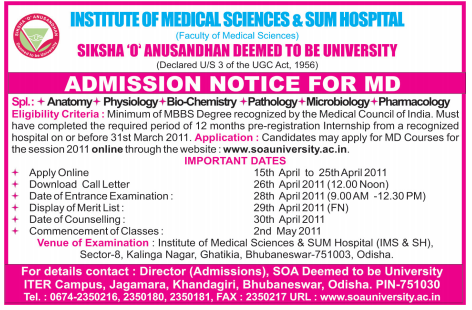
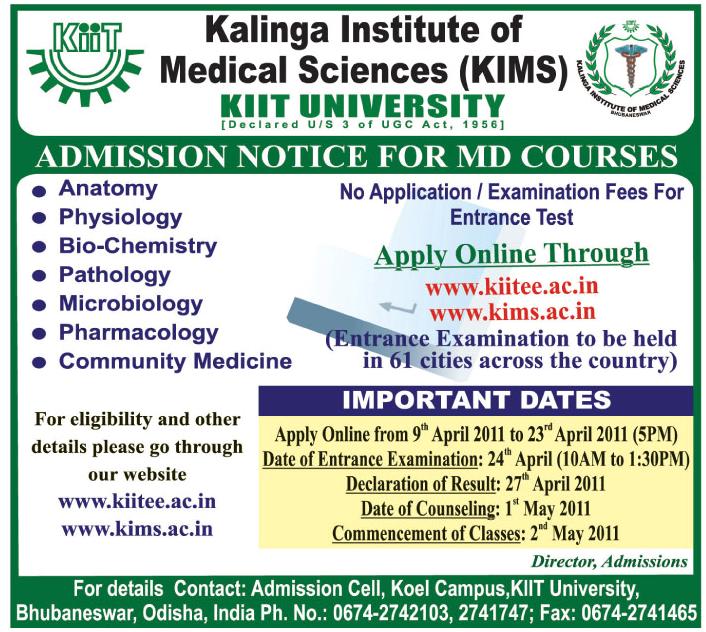
April 15th, 2011
Author : Chitta Baral
Next Posts
Previous Posts




 Note that one can study PG Diploma in Business Management and similar subjects (such as Rural Management) in several other institutions. Those are not listed above. Some of these institutions are: XIM Bhubaneswar, IMI Bhubaneswar, HDF Business School Bhubaneswar, IITTM Bhubaneswar, etc.
Note that one can study PG Diploma in Business Management and similar subjects (such as Rural Management) in several other institutions. Those are not listed above. Some of these institutions are: XIM Bhubaneswar, IMI Bhubaneswar, HDF Business School Bhubaneswar, IITTM Bhubaneswar, etc.








 Note that in addition to the above colleges (
Note that in addition to the above colleges (





